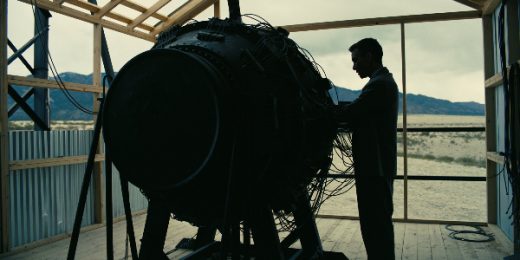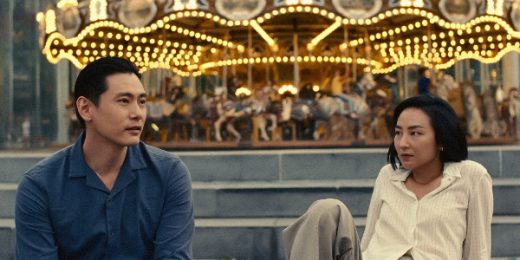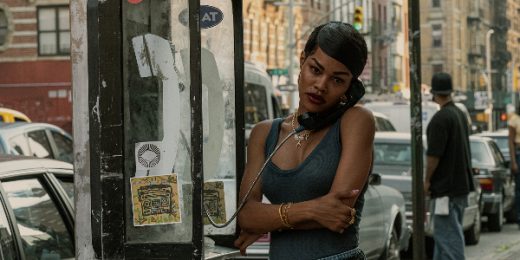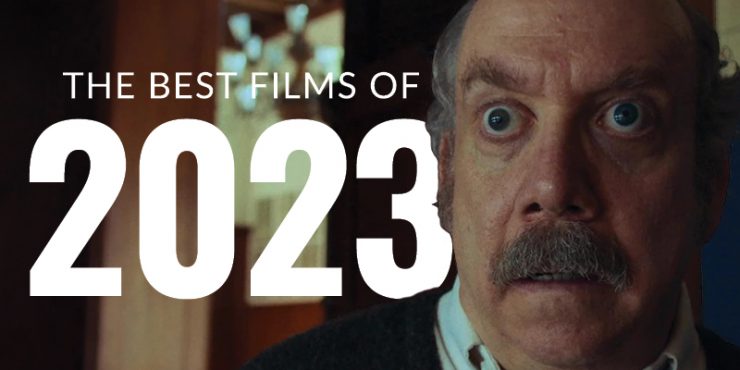If Hollywood in 2022 was defined by the encouraging commercial success of Top Gun: Maverick, then this year it was doubled by the twinned blockbusters that were Barbie and Oppenheimer in July. Barbie being a massive hit was not a surprise, though the scale of its success certainly exceeded expectations. It’s Oppenheimer – a three-hour historical drama directed by an auteur – that was the most culturally heartening. Not only are poptimist tentpoles making mega bucks, but also serious adult films are bringing in audiences. That combined with the relative box office failures coming from Marvel and Disney at large is a sign of changing tastes that had not been apparent for decades. It may prove to be a bellwether of the industry in the coming years – perhaps narrative risks can be profitable for the studios, who just cried poor during two prolonged guild strikes, complaining of dire financial straits and wielding the existential threat of AI. All that said, it’s still independent cinema that carries the torch for challenging and thought-provoking cinema, and 2023 was no different in that regard. Overall, this was a great year for good films, if not a good year for great ones. It was an array of newcomers – including some first-time directors – that gave me the most surprises, while some old masters continued to prove their meddle once again. Onto the list:
.

1. Anatomy of a Fall
Did she do it? The kitschy tagline belies how little director Justine Triet actually cares about the guilt of her protagonist, a novelist whose husband dies under suspicious circumstances. Sandra Hüller gives the performance of the year as a woman who stands on trial for a crime that she swears she did not do. The brilliance of Triet’s direction and script (written with Arthur Harari) is how it allows Hüller to play the role, a dual femme fatale and grieving wife, on the razor’s edge between put-upon intellectual and cold-blooded killer. Guilty or not, she does become a projection of our hunger for true crime sensationalism, and the narrative certainty that it demands. Anatomy of a Fall denies that certainty, but is still incredibly satisfying, finding steady ground in its characters’ unknowability, a chilling reminder of the limits of our own understanding. Bonus: one of the greatest dog performances in a very long time.

2. Oppenheimer
Christopher Nolan’s taste for blockbuster prestige reaches its zenith with Oppenheimer, a brilliant biopic that both satisfies the director’s hunger for non-linear storytelling while also being the most straightforward feature of his career. Cillian Murphy, so often brilliant in smaller Nolan roles, gets the lead here, giving a performance so perfectly measured that it’s almost too easy to miss the magnificence. Oppenheimer plays up the magnitude of what it portrays. Nolan’s script is extremely subjective, but never forgets the history-shifting significance. How does one transfer between theory and reality? The level of genius it takes to create on the scale of Oppenheimer is rivaled only by the level of destruction that such genius can wrought. Some critics have argued that Oppenheimer is self-righteous apologia, when in reality it takes stock of a guilt so large that very few minds have the capacity to comprehend it.

3. Past Lives
Past Lives starts in South Korea and ends up in New York City, by way of Canada, and in a way the film is about how these moves mean everything and nothing. Writer-director Celine Song is rethinking how we imagine romance in the cinematic landscape. Emotional intimacy, cultural longing, and relationship accountability are not exclusive from one another. One can be connected to another by forces greater than what we know. This film gives us Greta Lee – an actor known mostly for supporting parts and comedic roles – as Nora, a Korean immigrant whose grown into her married life in New York City, only to be drawn back to a childhood love. Teo Yoo plays the former flame, and John Magaro plays the white American husband. The love triangle, smoothed by sensitivity but also riddled with tension, is the center of Past Lives, a movie that posits that you don’t have to feel rejection to feel heartbreak.

4. May December
Like Anatomy of a Fall, May December wishes to make its audience complicit in its consumption of tabloid spectacle. Samy Burch’s script is a story about the acting process run through a story of a family born from a crime. The incredible director Todd Haynes takes said script and morphs it into a melodrama about exploitation large and small, whether it be the manipulation of a romantic partner, or the collective delusion of a town that accepts a predator in their world. Natalie Portman is an actress and Julianne Moore is the subject she’s playing in a movie. That alone is a recipe for a fantastic film, but May December is about so much more than on-screen competition (though that tandem does not disappoint). There’s also Charles Melton, playing the young boy turned man who becomes flooded with the realization of his own victimhood. It’s a necessarily sincere performance in a movie filled with ironic pastiche, and one that unlocks what makes this a masterpiece.

5. A Thousand and One
In a year filled with films about dysfunctional families, A Thousand and One is about a mother and son who strive to live harmoniously despite the hostilities of the outside world. A.V. Rockwell’s debut feature takes place in New York City between the eras of Giuliani and Mike Bloomberg, a transitional period that saw many native New Yorkers forcefully displaced. Teyana Taylor plays Inez, a woman raising her son off the grid as the Manhattan she grew up in rapidly changes around her. Her dedication to Terry (played by three actors over the course of twelve years) is her one constant in a life defined by hardship and struggle. Taylor, a singer by trade, gives one of the best performances of the year, playing a woman whose consummate strength is both her armor as well as her burden. Rockwell’s debut is a stunner of immense confidence, and the film’s score by Gary Gunn is not only the best of the year, but an all-time great.

6. Showing Up
Michelle Williams is an actor of such subtle intensity that it makes sense how perfectly she fits into the earthy spaces of Kelly Reichardt, a filmmaker whose origins as a Slow Cinema stalwart has ever evolved into incredibly effective emotional storytelling. In Showing Up, Williams plays a sculptor whose life is defined by bitterness and resentment. She feels the mundanity of her life and the callousness of her peers. Her landlord is a fellow artist (a hilarious Hong Chau) who’s dragging her feet on replacing her apartment’s water heater. Reichardt doesn’t try to thaw her protagonist’s frosty worldview, but instead, radically, allows that frostiness to meet the outside world, presenting the realities of most working class artists. Anyone who’s ever had any creative ambition will find great authenticity in Showing Up, a movie smart enough to show, through all the dissatisfaction, that there is beauty in creation, despite all it takes to get there.

7. La Chimera
Alice Rohrwacher envisions our world unlike anyone else. Her latest, La chimera, is a movie shot with the grit of Italian Neorealism, but imbued with magical realism, caught between the worlds of the rustic and the fantastic. How far would you search for a lost love? Josh O’Connor plays a British ex-convict whose mystical abilities help a marauding group of Italian grave diggers find treasure in the tombs of past lives. Romantic and idiosyncratic, La chimera is unafraid to be formless and set you adrift amongst the wondrous rural and urban landscapes. Whenever it begins to feel tedious, Rohrwacher smartly sets you back on the path of our mischievous crew, giving you a wonderful sensory experience as their travels bring us closer to the film’s true meaning. Rohrwacher is always a director that gives you strong catharsis from the most unexpected places, and La chimera is no exception.
.

8. The Holdovers
This is a movie for grown-ups. Not that the whole family couldn’t enjoy The Holdovers‘ scabrous Christmas melancholy, but director Alexander Payne is directly referencing the 1970s New Hollywood films of Hal Ashby and Bob Rafelson, ie films that were produced by Hollywood and released to mass audiences for adults. It speaks volumes that that feels like a novelty today. Starring Paul Giamatti, Da’Vine Joy Randolph, and Dominic Sessa as an unlikely trio spending Christmas break in a nearly empty boarding school, The Holdovers sets itself up for sentimentality, but the way director Alexander Payne takes us there is what really makes this movie sing. Of course, the film is also an homage to Giamatti, the film’s protagonist whose unlikely movie stardom was in many ways made by Payne’s Sideways. It’s moving to watch a director allow a great actor such a proper showcase, and seeing Giamatti in his element is always a recipe for great cinema.
j

9. Asteroid City
“I still don’t understand the play,” states Jones Hall, an actor who is playing the role of Auggie Steenbeck in the play-within-the-film of Asteroid City. Jason Schwartzman is playing Hall, who is playing Steenbeck, who is a father whose wife has recently passed. He and his children are trapped in a small desert town during a junior stargazer’s conference. When the vast cast of characters at the conference are visited by a meek alien about halfway through the movie, you might sympathize with Hall’s inability to follow the narrative. Wes Anderson has become so skilled at these Russian nesting doll story structures that we take his brilliance for granted. Auggie’s grief, and that of his children and father-in-law, is wedged between multiple layers of artifice, with each layer providing rich humor and vibrant color. This is far from Anderson’s first film about grief, but Asteroid City also plays as a wonderful encapsulation of his storytelling technique: the most biting lessons can delivered in the most beautiful packaging.
k

10. The Delinquents
You punch in, work your hours, go home. This rote life is oftentimes the best case scenario for many, and even then, the bleak repetition is enough to make it feel like a prison. The main characters in Rodrigo Moreno’s The Delinquents have spent decades faced with this existential malaise working at a bank in Buenos Aires. When one of them robs the safe, only to later turn himself in, he passes off the stash to a co-worker – hold onto the money and we can split it once my prison term is finished. What starts as a deconstructed heist film then turns into a film about two paths: one man languishes in a cell, the other is “free” but is still entrapped by his own paranoia and the menacing suspicions of his employers. The Delinquents is a film with strong intellectual arguments, even if it isn’t always interested in solutions. The pitfalls of capitalism, sure, but Moreno’s script takes aim at society at large, and the human delusion of freedom.
..
Honorable Mention: Barbie may end up being the most consequential movie of 2023, and no shortage of credit should go to Co-writer/director Greta Gerwig and producer/star Margot Robbie, who made a toy movie burst with cogent thought and lush cinematic vision; All of Us Strangers is a ghostly love story that breaks your heart as often as it fills you with joy; Are You There God? It’s Me, Margaret is a wonderful take on the Judy Blume classic which feels authentic in all the ways that have made the book such a standard; Blitz Bazawule’s take on The Color Purple is a soulful, spiritual experience that both pays homage while speaking defiantly for itself; Bradley Cooper unfurled his passions throughout Maestro, and directed Carey Mulligan to the performance of a lifetime; the great Jeffrey Wright gets the leading role worthy of his incredible talent in Cord Jefferson’s American Fiction; Perfect Days is a great testament to actor Koji Yakusho, and a lovely meditation on the virtues of internal peace; Dumb Money is an unexpected bulls-eye of contemporary satire, perfectly dramatizing the conflict that uncannily encapsulates the fraught state of our economic era; Sofia Coppola’s Priscilla is a striking biopic that spritely confronts a controversy white-washed by musical legend; The Taste of Things is as delectable as the pristine meals crafted throughout the film, a romance that speaks through the eternal language of food; Ferrari is the latest Michael Mann film about a tyrant facing the limits of his own control, and it might be the purest thesis statement of Mann’s entire career.










